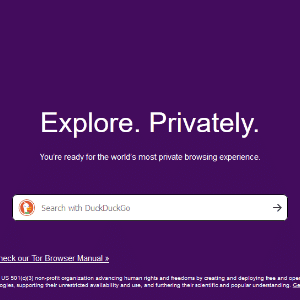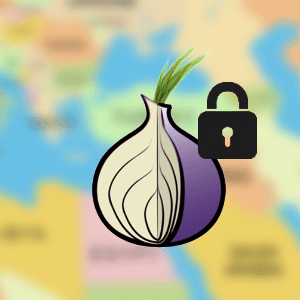Even if you are not doing anything suspicious or illegal, you may feel the need to hide your content and your identity from the thousands of dangerous external agents lurking on the web. If you connect to the Internet under normal circumstances, you will leave traces of your activity and your location that cyber and regular criminals can take advantage of.
That is why there are so many tools to hide your traffic and your IP number. Proxies, Smart DNS, VPNs, and the TOR network can help you have more privacy and a somewhat anonymous Internet experience, depending on each resource and how you use it.
En el caso concreto de TOR (siglas de The Onion Router), se trata de una herramienta muy utilizada para la navegación anónima en varios lugares. Sin embargo, dado que alberga tantas actividades "oscuras" o "dudosas", surge la pregunta: ¿Es TOR ilegal? Averigüémoslo.
 ¿Qué es exactamente TOR?
¿Qué es exactamente TOR?
Tor es una red descentralizada que se presenta en forma de software instalable que, una vez activado, permitirá al usuario acceder a la "web oscura", un término acuñado por la comunidad online para referirse a páginas y actividades que no suelen encontrarse en los motores de búsqueda habituales.
TOR implements a set of nodes, or relays, that will take some time to reach the final destination but will provide anonymity because the communication is set through a random, virtually untraceable path. It means that several devices randomly located across the planet will receive your request and “bounce” it along the network. Each node will only recognize the IP address of the closest devices.
El tráfico, si decides usar TOR, está encriptado, pero la gente puede verlo cuando recupera datos del punto final. Por eso TOR, aunque mejora la privacidad y proporciona un ambiente más anónimo para navegar que Google Chrome, Mozilla Firefox, Safari y otros; no protege del todo lo que haces o visitas en línea porque la gente puede espiar el tráfico desde los nodos de salida.
¿Es ilegal TOR?
Sabemos que te preguntas si TOR es ilegal o si puedes utilizarlo sin restricciones en cualquier lugar. La respuesta es sencilla: usar TOR es perfectamente legal. Incluso puedes descargarlo gratis, y el hecho de ocultar tu número IP también está permitido.
Sin embargo, TOR ha llamado la atención de las fuerzas de seguridad porque no todo el mundo en la web oscura se esconde de la censura o es un periodista que intenta proteger sus historias. El hecho es que hay miles de delincuentes merodeando por el entorno de Internet, y han aportado sus "talentos" a la plataforma digital.
There are numerous cybercriminals that hide under TOR’s anonymity to perform – and here is where the gray area starts – illegal activities such as child pornography, drug dealing, gambling, and others. In fact, studies have shown that the “dark web” hosts nearly 45% of illegal acts or pages.
Algo importante que hay que tener en cuenta al hablar de estos temas es que TOR no es 100% efectivo. Puede que no mantenga tu contenido completamente oculto a las fuerzas de seguridad y, a veces, tiene el efecto contrario: como estas organizaciones saben que hay muchos delincuentes ocultos tras el cifrado de TOR, la red en realidad atrae su atención.
 VPN, la alternativa perfecta a TOR
VPN, la alternativa perfecta a TOR
An even better anonymity and privacy tool is VPN technology. The word VPN stands for Virtual Private Networks, which are online encryption resources that come in the form of apps and clients. They can reroute the user’s traffic and IP number to remote servers to keep them away from hackers, governmental surveillance, malware developers, online advertising, e-commerce and shops, and even from your Internet Service Provider.
Se ha demostrado una y otra vez que los ISP son una de las espadas de "doble filo" más peligrosas que existen cuando se trata de la privacidad de tus datos. Recopilan registros de tu actividad, patrones de búsqueda y navegación y luego los venden al mejor postor, sea quien sea.
VPNs provide privacy and anonymity because they mask your online identity and can lend you another IP address for temporary use. The user can choose to connect to a virtual server from any country, provided that it is included in your brand’s catalog.
TOR is not illegal, but you may be better off using a VPN anyway since the technology isn’t nearly as slow as what TOR implements. Besides, Virtual Private Networks have several security measures and resources that you can’t find on The Onion Router, such as DNS leak protection, double VPN, secure Wi-Fi, kill switches, split tunneling, and more.
IPBurger is gaining steam and is quietly becoming one of the preferred VPN options in the market. It offers both shared and dedicated IP address, it supports streaming and torrenting, it has satisfactory speeds, and it implements robust encryption at very affordable costs, starting with a monthly plan of $5.
En conclusión, dado que alberga tantas actividades moralmente dudosas en la web oscura, puede que te preguntes si TOR es ilegal. La tecnología en sí es legal, pero casi el 45% de las cosas que se hacen bajo su cifrado pueden meterte en problemas legales, así que puede que sea mejor que te mantengas alejado y utilices una VPN en su lugar.
 VPN, la alternativa perfecta a TOR
VPN, la alternativa perfecta a TOR

